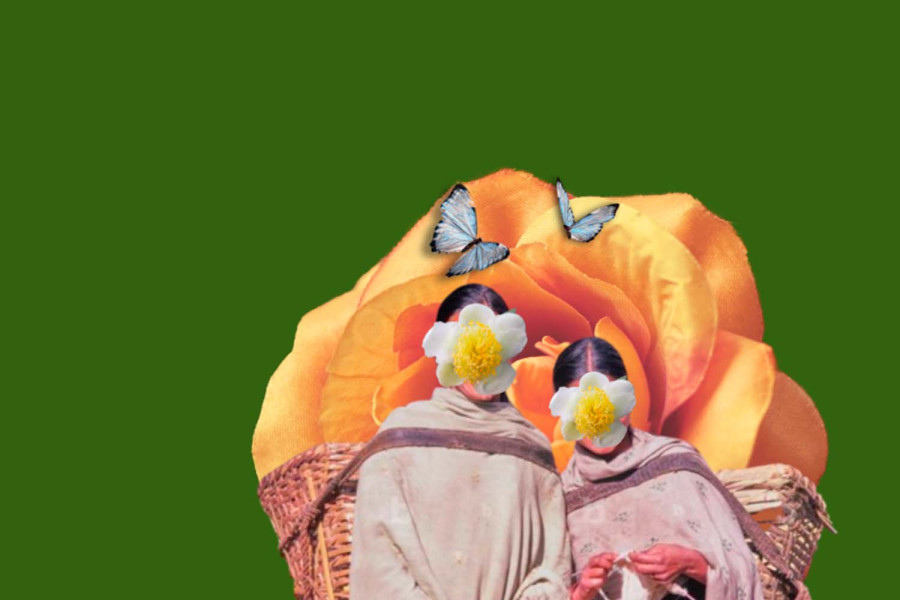Fiction Park
Collecting fragments of identity
Caught between her Nepali roots and Indian identity, Tamang recalls the day when democracy and violence collided.
Anuvishub Sanjay Tamang
Those bloods in her memories still stink. What was it about the violence that philosophy, history and literature often find themselves captive to the glory of displacement? She might, too, have found placid glamour in her pages. The radiance dimmed, and memories were exhausted, reclaiming its space against the interminable flow of time visible on its surface. Only after several years, and the patches that still have not worn out under the weight of time and cobwebs, had become memories of a past comprehensive and meaningful whole.
For the world to see, as testaments to the moments of wholeness, there are only the faded marks of guns and memoirs of bygone eras, she wrote.
Mrs Tamang
She wasn’t too sure, though. But then again, on the Sunday of June in the year eighty-six, her identity as a Nepali was shaken and pushed around, molested tyrannically by her Indian self.
She blamed herself for every camouflaged, inhuman figure that crossed into the battlefield on that cursed day, for it was she who had elevated the conductor of this brutal and bloody symphony to power. It had been she who had walked to the nearest polling booth and, blinded by the promises of the future, had pressed the button, which set the stage for the jazz of destruction, like expending energy in turning the key of a music box, that was to play, in the future, a tune unpleasant to her ears. In another sense, the movement of her fingers, from the inside of the right pocket of her wooden green knitted sweater to the surface of the white ballot box, was much like the determined fluttering of a butterfly’s wing. This metaphor only came to her after she had spent some time reflecting on the happenings of those ten days in June and the morose October.
In time and space, the slightly blue and predominantly black election ink was much like the patterns on the wings of those false mongers of hope and beauty. They had to be wrong because, in several ways, the fluttering of those fingers had put into action a butterfly effect that brought a storm released onto herself, a butterfly effect that traversed years and not continents. Hadn’t it? Hasn’t democracy been sold to us just as butterfly stickers are sold, in hope for Spring, and doesn’t the election ink remind one of one’s democratic right over nature, a nature which unfolds in front of her, awaiting her capture? At least the believers had said so, she wrote.
Then God said, “Let us make humankind in our image, after our likeness, so they may rule over the fish of the sea and the birds of the air, over the cattle, and all the earth, and all the creatures that move on the earth.”
But she was an atheist herself. Spring unfolds for us—butterflies and Democracy. And that is why, in her guilt as an Indian and her tragedy as a Nepali, she wished for absolute desecrationㅡfor an unevenly halved tapestry.
(Un)exist
She wanted to see it; holding on to the bamboo scaffolding, struggling to collect fragments of her own identity in the faith of violence and concrete, she glanced over the cold carcass of a young man.
The first thing she noticed, on seeing it, was the familiar face dressed in the radiance of blood under the Autumn sky, which was temporary relevance, like those dying of slow and painful death, stretched over years and nights of humiliating sickness; she wished for liberty, all at once, regardless of if it came with a more severe and more harrowing ache if it promised to be short-lived. She hoped for the complex to cease to (un)exist, to vanish entirely because there was, now, an unevenly halved tapestry ripped through the middle, one she never wrote a history on without any trace of Darjeeling or her butterflies.
If the state could unleash violence upon the band once, what was stopping them from doing it again? If the liberty of the Indian dream can be pierced into once, what safeguards its sanctity from then on? There were several questions she had to ask yet.
When families fall apart, to convince oneself of the happy times and that they were indeed natural, one visits the family home, which is at once a graveyard of pleasant memories and an ever-blossoming garden of prejudices, hatred, and a nostalgic repulsion. The same family home also brings to one’s mind, and in a way asserts it, the fact that it doesn’t exist as it did in the past anymore. The place at once embodies all three tenses, regardless of the one the individual chooses to inhabit: the untainted past, the smeared moment of destruction and the perpetually scarred time to come.
The subjects of all tragedies have the choice to hold on to the past post-conflictㅡas her mother had after the colonial assault and complex migration of brutality, constantly paranoid of losing the one saree she had managed to salvage from before the colonial and imperial displacement. But an altogether realisation of the past, the decimation, and the insignificant future is essential for those who have been hurt to keep themselves from becoming distended among the slick layers of time and their endlessness.
The World Somewhere
She would remind herself of the time before it and the absolute tyranny of the midnight of June in eighty-six. She wouldn’t let the patches fade away into a whole, and she couldn’t because, to her, the only way of shedding her guilt and grief was to write about the horrors of it. As if by revisiting the cathedral of pain and squalor scripting in papers, she would bequeath some authority to the work of her future, all of which would always touch the reader with a jaundiced caress, the unwelcoming nature of that one Summer and the aversion of October, the same year.
And that is when she broke her resolve but had doubts.
Mrs Tamang is 82 years old.
Tamang is a Kathmandu-based writer.




 16.33°C Kathmandu
16.33°C Kathmandu










